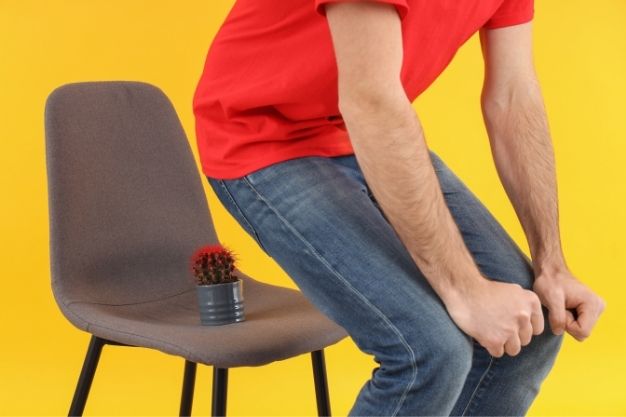The terms piles, fistula, and fissure are frequently contrasted. While piles are swollen blood vessels surrounding the anal canal, a fissure is a break or split in the anus tissue, and a fistula is an irregular tunnel connecting the anus to the surrounding skin. This page will explain the fistula, fissure signs, causes, fistula vs fissure, and homeopathy treatment.
The key distinction between Piles, Fistula, and Fissure is:
- The blood arteries inside the anal canal are affected by piles
- A fistula is an unnatural tube that forms between the anus and the surrounding skin
- A fissure is a visible painful crack in the anus tissue lining
Here are some brief facts:
- They may impact 75% of the population by the age of 50
- It’s common throughout pregnancy
- They can be both internal and external
- Symptoms may include bleeding after passing stool or bloody stool
- External hemorrhoids can occur when blood clots around the anus
- They usually heal themselves even before symptoms arise
- Chronic constipation and unpleasant bowel motions are to blame
What exactly are fissures?
Fissures are quite painful. Apart from constipation, which is frequent in all three, piles are also linked to pregnancy and a persistent cough. Fissures are related to diarrhea and make it difficult to excrete.
- It occurs when a person extends and pushes himself excessively to defecate
- If infected, they may exude blood or pus
- They can arise due to constipation, diarrhea, or strenuous exercise
- They primarily affect those over the age of 50
- They can appear in both acute and chronic forms
- A fiber-rich diet and medicines can rapidly treat an acute fissure
- Chronic disease is difficult to control and has a high recurrence rate
Here are some facts regarding fissures:
- It usually happens when a person stretches and exerts much pressure to defecate
- If a person is infected with a fissure, they may exude blood or pus
- Constipation, recurrent diarrhea, and excessive activity can all cause fissures
- It has the potential to introduce acute and incurable features
- A fiber-rich diet and treatment can easily repair an acute fissure
- Chronic disease is difficult to manage and might reoccur

Anal Fissure Symptoms
- There is a visible rip around the anus.
- Sensations of burning and itching in the anal region
- Stool that is hard and bleeding
- Excruciating pain during and after defecation
- A little perianal abscess is a serious disease
Fissure Causes
- Hard feces
- Hemorrhoidectomy and other surgical procedures
- Multiple childbirths & Inflammatory bowel diseases, such as Crohn’s
- Laxative and ointment usage
- HIV/AIDS or Syphilis
Is it possible for a fissure to develop into a fistula?
Lateral internal sphincterotomy is the surgical treatment of choice for persistent and refractory acute fissures. An anorectal fistula is an abnormal tube that connects the anorectal mucosa to the skin on the outside. Fistulas generally form due to the rupture or draining of a perianal abscess.
What is the severity of a fistula?
Fistulas may be extremely painful and, if left untreated, can lead to significant consequences. Some fistulas can produce a bacterial infection, leading to sepsis, a potentially fatal disease that may lead to low blood pressure, organ damage, and even death.
What is the cause of an anal fistula?
Pus is discharged from the anal region in the event of fistulas. Blocked anal glands and anal abscesses most commonly cause anal fistulas. Other, extremely rarer diseases that can result in an anal fistula include:
Crohn’s disease (an inflammatory disease of the gut) (an inflammatory disease of the intestine)
- Ionizing radiation (treatment for cancer)
- Trauma
- Diseases spread through sexual contact
- Tuberculosis
- Diverticulitis is a condition that affects the digestive tract (a disease in which small pouches form in the large intestine and become inflamed)
- Cancer
What signs and symptoms indicate an anal fistula?
An anal fistula has the following signs and symptoms:
- Anal infections are common
- Angioedema (pain and swelling around the anus)
- Bloody or foul-smelling discharge (pus) from an anus hole. The discomfort may subside after the fistula empties.
- Discharge irritates the area surrounding the anus
- Constipation discomfort
- Bleeding
- Fever, chills, and an overall sense of tiredness
If you come across any of these signs, consult your physician immediately.

What is the difference between a fissure and a fistula?
There is not much distinction between fissure and fistula, and contact with your homeopath is necessary to assess the condition. Fistulas are typically seen in individuals with Crohn’s disease and noted in persons who sit in one spot for a long period and are fat.
While the distinction between fissures and piles is straightforward, the distinction between fistula and fissures is more difficult to understand.
Treatment using Homeopathy
The anal canal is affected by piles, anal fistulas, and fissures. This similarity, however, should not be misinterpreted as a single disease like fistula vs. fissure. These disorders affect the human body in different ways and to differing degrees.
It is critical to examine each symptom and get medical attention, if needed, thoroughly. Consult your doctor right away if you have piles, anal fistulas, or fissures, and you’ll be back to normal in no time.
A Patient suffering from anus bleeding or discharge should always contact a homeopathic physician. Anal fissures Vs. Fistula is a common diagnosis. These are issues that are generally simple to identify and solve. When these issues are serious, various treatments, including surgery, are available to treat them. Consulting with homeopathic professionals typically results in a positive result.








